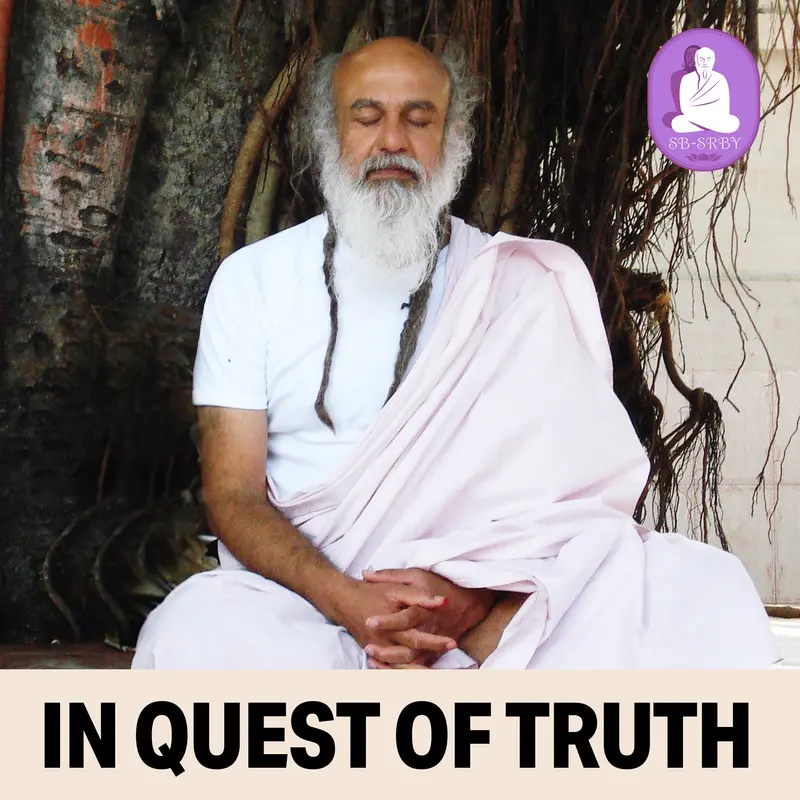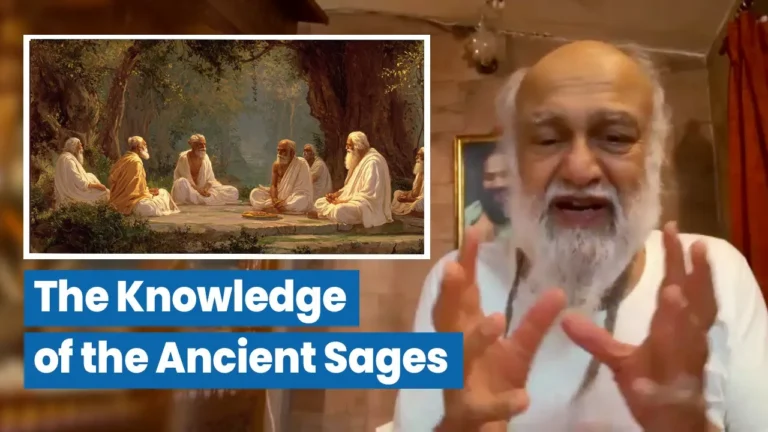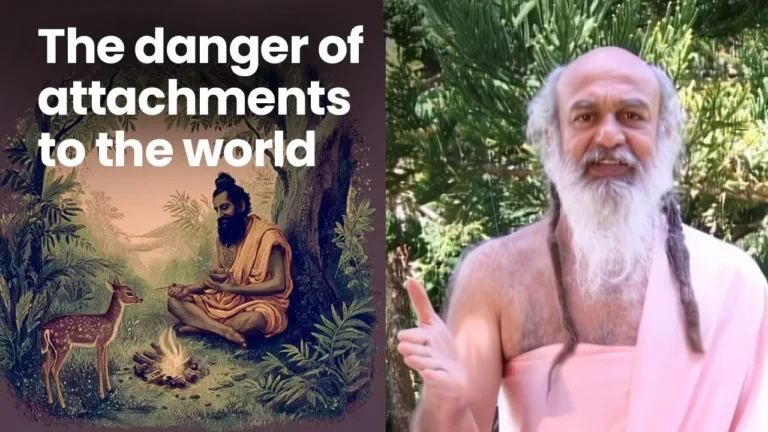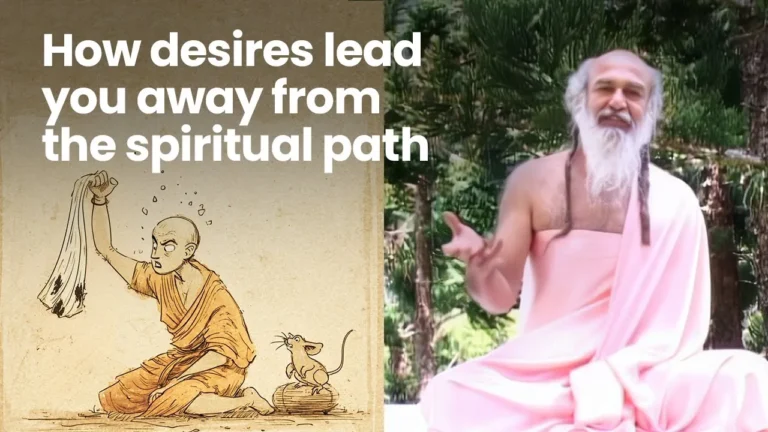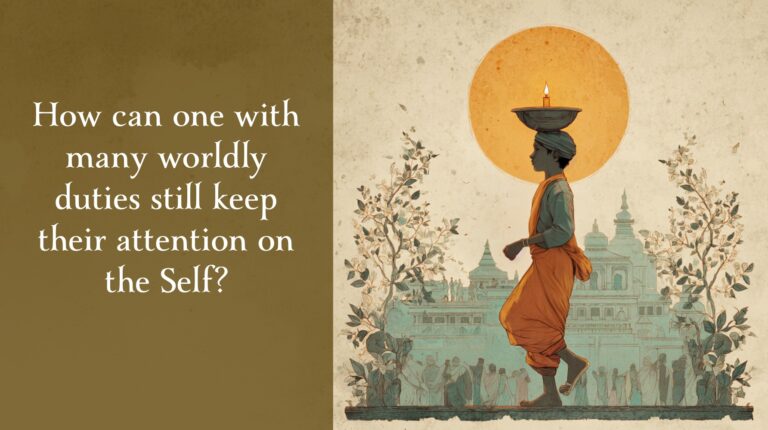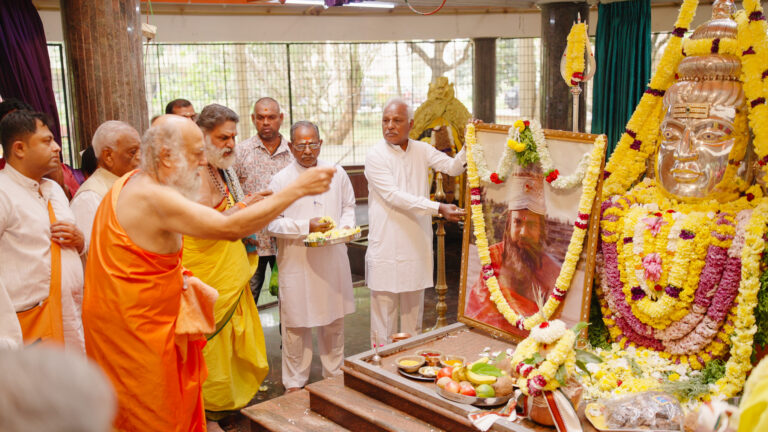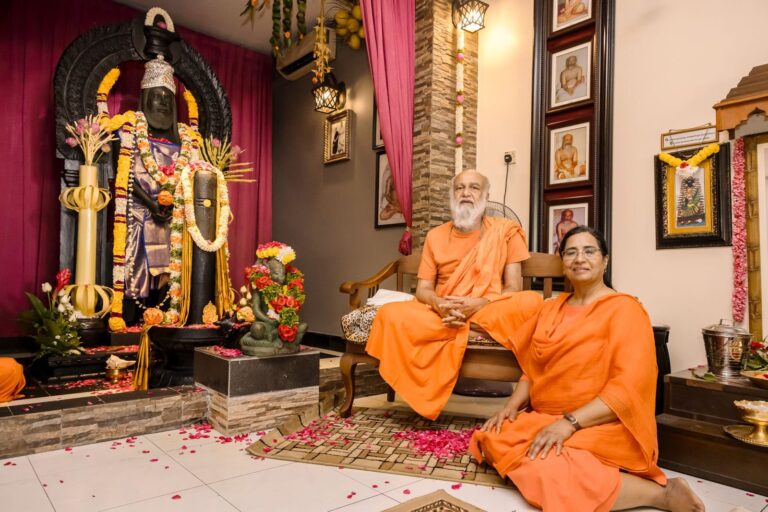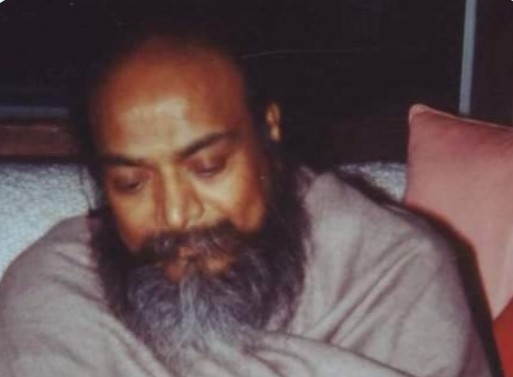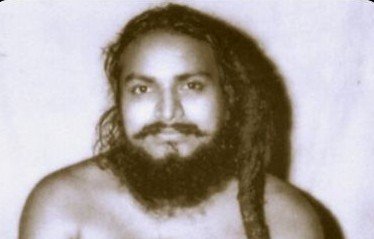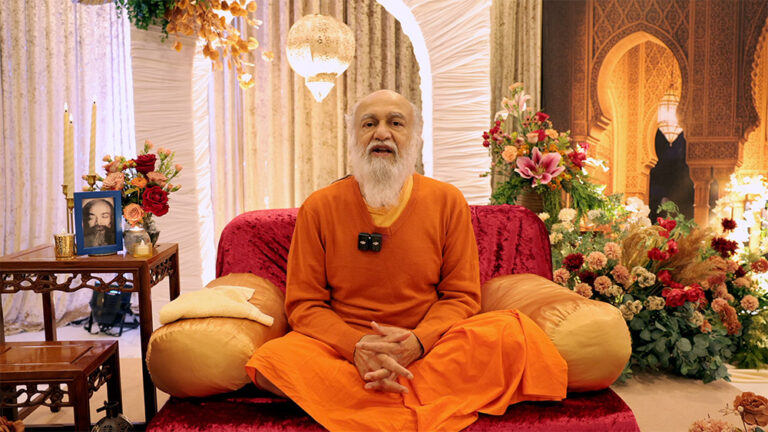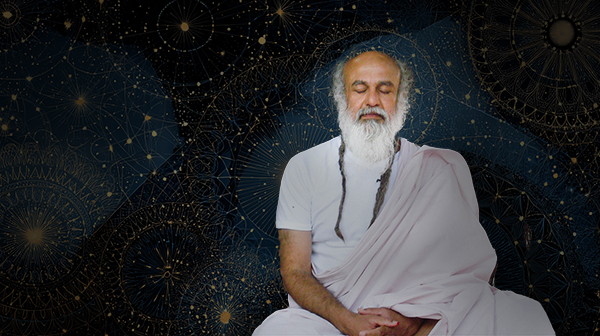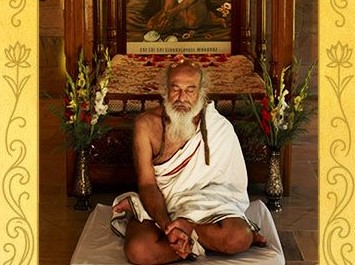London retreat 2007 – Q & A

Question:
So Babaji, from what You have spoken for a normal person every thought – and that means whatever we think – every thought leaves an impression…
Babaji:
Yes, it leaves an impression. That is why it is said, “What you think, you become.”
Question:
So, when we have thoughts, do we just observe that thought, but not recognize that thought?
Babaji:
Yes, there is a very thin-edged difference between these two. You need to practice this skill to make your meditation more successful. That is what the Guru repeatedly teaches. For the initiation time we tell, “Do not imagine anything. Just keep watching.” So that’s what the first important thing is for a sadhak to achieve the concentration of the mind. That’s what it is, not to bother about anything else during meditation. Then the meditation becomes successful.
Question:
I have just started meditation, but I’ve been doing yoga for a few years. I find the only way I can concentrate is with a candle in front of me, so I can concentrate just by watching the candle at all times, and bring the candle into my mind and holding it there. Is this another way?
Babaji:
For a while it is OK to begin with, but eventually you will have to abandon that. For the practice of concentration you can use the candle, there is no harm. That’s like using any other form of God also. In my student days, I also used to practice that. Because I had fallen in love with my Master, I kept His picture in my room, and before I used to switch off the light in the night while going to bed, I used to keep watching His photo, then the mind would absorb that image of the Master. So it became single-pointed, and eventually it became easier to meditate. So like that you can have the candle for a while, you can focus with that, but don’t get addicted. Eventually try to abandon it. Because if you abandon it, then you would be giving the mind itself practice to become quiet on its own, without any external anchor.
Question:
I lost my supply of vibhuti when my wallet was stolen some weeks ago, and I was wondering how important the application of ash between the eyebrows is to the technique. Do you have to do that to do this technique, or not?
Babaji:
It is not a must. It is normally given out as a traditional practice to provide an anchor of a devotional object for a student, so that the student shall have total faith that the Master’s Blessings are with him through that.
Just like giving some symbol, any symbol, a photo or a cross, or an idol, anything is given; it is also a traditional practice in India to give the vibhuti. If it is there, it is welcome and good; you might use it as an anchor in the beginning. Even if it is lost by chance, without it also you can meditate.
What is necessary is faith in yourself. That is the most important thing. Faith is the most important thing that you need to cultivate. If you have faith, it can work wonders for you. That is why sometimes I jokingly say, when you buy my photo, if you ever get annoyed with me, don’t get annoyed with the photo, because that photo is your faith. Don’t allow it to waver. So if you have that faith within you, even without the holy ash also it is OK.
Years ago, in 1978, three or four years after I joined my Master, a couple of His disciples had sat for tapas, but they were getting disturbed and were wanting to get out of the tapas and go away. At first I was attracted, thinking that I would do tapas also. Then it was my birthday, on 20th September, so I took a small piece of vibhuti (this type of holy ash) and went to my Master’s room where He was resting, and gave this to Him. “Please bless this for me.” He asked, “For what purpose do you want this to be blessed?” I said, “I want to do tapas.” He teased me: “Do you think this vibhuti can make you to sit for tapas?” I said “I have faith; You just bless, and You give it to me. In Your name, it can work wonders for me.” Well, however, He said, “maybe you can sit and do tapas just now, but you might become egoistic because the time is not yet ripe, and you might go away from Me physically.” So then I lost interest. I said, “No, I don’t want tapas. I want to be at the Lotus Feet of my Master, because that is my first love and first interest, so the tapas can happen whenever you want.” So I just took back the vibhuti and came out.
Question:
Is there a particular thing about using intoxicants like alcohol or marijuana whilst you’re starting the practice of meditation?
Babaji:
Spiritually intoxicants are totally prohibited. No type of intoxication should be taken. Even some monks out of misguidance, they use a crude form of opium, called bhang. That’s also totally wrong, because all these things curtail the nervous system and suppresses the brain waves.
As I was trying to explain, mind is your conscious energy, brain is the biological organ in the body. Brain and mind have a peculiar connection with each other. One is active because of the other. So, if one takes alcohol or any such drugs, they experience some bliss – that’s what we hear from such people. But what happens at that time, like during the sleep state, the brain’s reflections get suppressed by this medicinal effect, so the mind does not have anything to catch, and it gets kicked off the brain temporarily. But the mind itself does not get cleansed, its acquired habit remains. So once this medicinal effect on the body goes away the brain’s reflections jump back in a double speed, more excited, and the mind gets sucked into it again. And in the long run the quality of the brain’s health gets affected badly.
So unfortunately, what happens is that the physical health is being lost, brain’s health is also being lost, and the meditation does not progress for such people. I have seen such monks who use this bhang, but they have not at all progressed in any way. Their attitude, their patience, their composure, their knowledge, wisdom – nothing has progressed. It’s a very sad thing. So one must remember, no intoxication should be used. Otherwise, all sleeping people, whoever used to go to sleep and whoever has alcohol would have easily become Yogis. There would be no need to do tapas.
The spiritual exercise called meditation and tapas is a natural process. Without trying to harm the health of the brain, you are taught to skillfully withdraw the mind. Mind is your conscious energy; if you exercise some will power, then you can withdraw it. That is the technology that is taught. If you do not analyze the reflections of the brain, then the mind gets withdrawn. It is like you are forced to watch a movie, and the Guru asks, “Try, not to analyze this movie, just watch it.” It is so difficult. The mind gets sucked into it, you start analyzing the good, bad, every effect, and you start watching yourself into the movie, all the good, bad, the fearful, everything seems as if it is happening to you. Your voice might be choked with pain and fear, all these things. But it is only a movie you must remember. If you gain the ability to keep the mind withdrawn, then the meditation becomes successful.
Question:
When we talk about the meditation being successful, I mean for me, when I meditate every day, to me it is successful when I kind of connect to the world around me afterwards, when it has an impact on the very day that I’m meditating. I don’t really meditate because I want to be Self Realized, because nobody knows when that is going to happen. I don’t think I would have the energy or patience, unless it had some kind of impact on the day. And sometimes it happens, but I don’t know what the mechanism is, why sometimes you have this feeling of connection to everything around you, and your day just goes really well, and everything is just very easy.
Babaji:
You see, in this world, when you live, when you put in efforts, you may have some expectations. The mind always puts in an effort with some expectations. Without an expectation, it does not want to work at all, nobody would like to work. This is the habit of the mind. However, there is no such universal law or guarantee in this world, that all your expectations shall come true as you expect only.
You might be putting in very good effort sometimes, but the result may not come according to your expectations. If it does not happen according to its expectations, mind gets disappointed. It can go into frustration and disappointment, all such things. If it happens according to its expectations, then it is very good. The whole day passes beautifully. As long as everything goes on happening according to your expectations, this world appears so beautiful and so wonderful and so you don’t want God, you don’t want anything else. But the day it starts happening negatively, then it becomes torturous to the mind, mind does not accept. Through the practice of this meditation, whether anything happens or not, your mind becomes able to accept the things as it happens, accept the things as it comes. Sometimes you may expect a hundred dollars, sometimes it may come only ten dollars, but still the mind would have that satisfaction. When you have satisfaction, everything appears surplus.
So this is the trick of the mind. This meditation neutralizes the mind’s effect. You see, otherwise the mind does not stay in the present at all. Either it is brooding about the past, or is anxious about the future. So that is why this meditation is taught. Even if you do a little bit, half an hour or one hour also, sincerely with the proper technique, then at all times your mind shall remain in peace, with total happiness. Whether anything happens in this world for you – good, bad, right or wrong – mind is able to take it. So that is why this is recommended, so that it can keep your mental energies intact.
Question:
Do certain people react better to certain types of sadhana? In other traditions they emphasize the pranayama rather than the meditation. I know in Your tradition the meditation is central. Does it vary from person to person?
Babaji:
It can vary from person to person. That’s why, as Yogis, we do not try to impose any one method. We give them a choice, we try to encourage that all methods are equal and honorable. Simply we try to tell the technicalities. If your idea is eventually you want to pursue and go towards the Self Realization, then you have to eventually abandon everything and the mind has to totally become quiet. However, some people are inclined to do other methods; some might be inclined to do bhajans and singing and service. That’s why in our philosophy, through every method, one can go to the Reality, the Ultimate Truth. But the method needs to be adopted properly.
Suppose you want to do japa, your mental concentration has to be totally there. One hundred percent concentration when you are repeating the mantra, only the mantra is there and not even you exist for yourself. That type of hundred percent intense concentration has to happen. Then the meditation will be successful, eventually.
Pranayama, breathing exercises, are also the same. You see, if you are restless at any time in your life, take a couple of minutes, sit down quietly, take a long inhale and exhale. Your restless mind becomes a little restful. Concentrate on the breathing, so your mind can become better concentrated. But if the mind stops on the breathing only, what next? It cannot go introverted and achieve the Self Realization. Then either the Guru would guide you to abandon that anchor also, or the Divine Itself will take some shape and will guide you so that you abandon all such things.
If you all have read about Ramakrishna Paramahamsa’s life, He started by devotion to Mother Kali. He wanted to see God. He used to bang his head, “One more day has passed without Mother appearing in front of me.” He did amazing great tapas which is very, very difficult in this age. So eventually the Divine worked it out. Totapuri Maharaj came to Him and taught Him how to abandon all imaginations.
When He came and told “I want to give you sannyas and teach you the nirvikalpa samadhi,” Ramakrishna was very innocent. He said, “I need to talk to my Mother and take Her permission.” Totapuri ridiculed Him and said, “What a child’s play! Go, go and talk to your Mother.” He went into the temple, stood in front of Mother Kali’s idol for five minutes, then comes out and tells, “Yes, Mother has told that I can learn from you, there is no problem.” So He makes Him to sit in lotus posture, asks Him to concentrate here [the point in between the eyebrows] His mind and sight. But afterwards Ramakrishna opens His eyes, saying “I am able to withdraw all my senses, but I am unable to remove Mother’s picture. She is always standing here; I don’t know what to do.”
Getting annoyed, Totapuri is said to have taken a sword and cut the wooden idol of Mother Kali into two and said, “Your Mother Kali is dead, I have killed Her. Forget about Her.” Then He took a small piece of glass and pierced it in-between Ramakrishna’s eyebrows. Then Ramakrishna goes into nirvikalpa samadhi for several days. Even for Totapuri it was amazing how great a tapasvin that Ramakrishna was.
So that is how it can happen. The Divine will definitely grace and bless, so if anybody wants to take any other method, it is no harm.
Question:
Babaji, earlier you were talking about the importance about faith. Is it possible to tell us the story about Kanakadasa?
Babaji
Yes, just to tell you about faith… Saint Kanakadasa lived in the southern part of India in Karnataka, about five hundred years ago, during the reign of the Vijayanagara Empire. He was a shepherd boy looking after buffalos and cows. One day when he was in the outskirts of his village looking after them, he saw some priests performing worship for some people. He got attracted. He belonged to a lower community who the egoistic priests always considered to be untouchable, so he stood at a long distance and watched.
After the puja was over, he goes and requests the priest, “Sir, please teach me this worship. I would love to do this, it is so wonderful.” They teased and made fun of him, “What can you do? You only look after the buffalos and cows – that is all your wisdom. OK, you do one thing, go underneath the tree, sit down, and go on repeating ‘buffalo, buffalo, buffalo.’ God will come to you.” So they actually teased him.
But that innocent boy, in the purity of his heart, took in good faith what the priests told him. He went and sat underneath the tree and started repeating “buffalo, buffalo.” In his Kanada language, “kona”. Kona means buffalo. He went on repeating that one. And the story says that legend has it that he had the vision of Lord Yama, the death god, coming on the buffalo. Lord Yama initiated him into the name of “Keshava”, one of Vishnu’s forms, and guided him to go to Sage Vyasa Thirta, who was also a Self Realized Master of those days. So there he went and took initiation, and taking guidance later he became a Self-Realized soul.
So other students in that institute used to be jealous of him and made fun of him, because he remained silent and quietly absorbed in his own Self, contemplating about the Self always. One day, to teach a lesson to the other students, the Guru gave bananas to each of the students, and told, “You all go out, and go to such a place where nobody would be watching you, eat this banana and then come back and report to me. That is the challenge for you all.” They were given a stipulated time to come back – before sunset. “Oh this is so easy, Master, this is no problem, within five minutes I can eat and nobody will be watching me.” So every student went and ate the banana and came back, and they all reported, “I went behind the mountains,” “I went onto the tree,” “I hid myself behind the bushes,” like this they gave a hundred reasons, “Nobody was watching me, I can guarantee this to you.” And they all sat, waiting for Kanakadasa.
He never came back. It was afternoon, lunchtime was over, and everybody was murmuring, “This small job that the Guru gave, this idiot Kanakadasa could not do even this much also.” “Today the Guru is going to expel him from this institute,” they all thought. They were teasing him. In the end, before sunset, Kanakadasa comes back with the banana. Keeping it at the Lotus Feet of the Master, he says, “Master, I tried my best to eat this banana where nobody would be watching. I went behind the bushes, I went behind the mountains. I went everywhere but here and there and everywhere Lord Keshava was watching me. Whenever I tried to peel this banana and eat, Krishna was watching. So I failed in the task that you gave me.”
And so the Guru rebukes the other students, “You see, this is the knowledge and wisdom. This is the real devotion. If you have the devotion, God will always be visible to you.”

